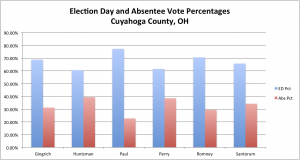Doug Chapin says I am just an old crotchety guy. I’m old and I’m crotchety, but I don’t think I’m being unfair. I just get worried when something is oversold.
Here’s what TurboVote promises:
If voting were easier, more people would do it. And if more people voted, we could reinvigorate local and primary elections, politicians would be held more accountable, our leadership would be more representative, and our democracy would work better.
Making voting easier helps, but it’s only one link in the chain of accountability. Przeworski, Stokes, and Manin write in the introduction to Democracy, Accountability, and Representation, when describing the difficulty in disentangling competing notions of representation, accountability, and democracy:
Yet, there are some things we have learned. Perhaps foremost is the importance of information. The main difficulty in instructing governments in what to do and in judging what they have done is that we, citizens, just do not know enough.
Vastly increasing votes without simultaneously improving the quality of the vote could easily do more damage than good, particularly in an age where we can be micro-targeted down to our underwear size.
I am not trying to be crotchety; I hope I am instead constructively critical. My worry is buyer’s regret. Transforming the American political system will take place in decades, not in months. Once we make voting easier, it’s time to make politics easier. Then we may witness a true sea change.
P.S. The link above lists a great sounding job for someone interested in election data (although there are 3810 counties, not election jurisdictions. The latter number exceeds 10,000 when you take into account townships and municipalities).

